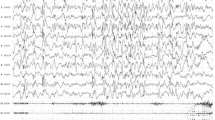Abstract
Mutations in PRRT2 have recently been identified as the major cause of autosomal dominant benign familial infantile epilepsy (BFIE), infantile convulsions with choreoathetosis syndrome (ICCA), and paroxysmal kinesigenic dyskinesia (PKD). Other paroxysmal disorders like febrile seizures, migraine, paroxysmal exercise-induced dyskinesia, and paroxysmal non-kinesigenic dyskinesia have also been shown to be associated with this gene. We re-evaluated PRRT2 mutations and genetic–clinical correlations in additional cases with PKD/ICCA and other paroxysmal disorders. Two novel mutations in PRRT2 were revealed in PKD/ICCA cases, while no mutations were detected in other diseases, which suggests BFIE and PKD are still core phenotypes of PRRT2-related spectrum disorders.

Similar content being viewed by others
References
Chen WJ, Lin Y, Xiong ZQ et al (2011) Exome sequencing identifies truncating mutations in PRRT2 that cause paroxysmal kinesigenic dyskinesia. Nat Genet 43(12):1252–1255
Lee HY, Huang Y, Bruneau N et al (2012) Mutations in the novel protein PRRT2 cause paroxysmal kinesigenic dyskinesia with infantile convulsions. Cell Rep 1(1):2–12
Heron SE, Grinton BE, Kivity S et al (2012) PRRT2 mutations cause benign familial infantile epilepsy and infantile convulsions with choreoathetosis syndrome. Am J Hum Genet 90(1):152–160
Riant F, Roze E, Barbance C et al (2012) PRRT2 mutations cause hemiplegic migraine. Neurology 79(21):2122–2124
Gardiner AR, Bhatia KP, Stamelou M et al (2012) PRRT2 gene mutations: from paroxysmal dyskinesia to episodic ataxia and hemiplegic migraine. Neurology 79(21):2115–2121
Marini C, Conti V, Mei D et al (2012) PRRT2 mutations in familial infantile seizures, paroxysmal dyskinesia, and hemiplegic migraine. Neurology 79(21):2109–2114
Dale RC, Gardiner A, Antony J, Houlden H (2012) Familial PRRT2 mutation with heterogeneous paroxysmal disorders including paroxysmal torticollis and hemiplegic migraine. Dev Med Child Neurol 54(10):958–960
Liu Q, Qi Z, Wan XH et al (2012) Mutations in PRRT2 result in paroxysmal dyskinesias with marked variability in clinical expression. J Med Genet 49(2):79–82
Cloarec R, Bruneau N, Rudolf G et al (2012) PRRT2 links infantile convulsions and paroxysmal dyskinesia with migraine. Neurology 79(21):2097–2103
Sheerin UM, Stamelou M, Charlesworth G et al (2013) Migraine with aura as the predominant phenotype in a family with a PRRT2 mutation. J Neurol 260(2):656–660
Scheffer IE, Grinton BE, Heron SE et al (2012) PRRT2 phenotypic spectrum includes sporadic and fever-related infantile seizures. Neurology 79(21):2104–2108
Liu XR, Wu M, He N et al (2013) Novel PRRT2 mutations in paroxysmal dyskinesia patients with variant inheritance and phenotypes. Genes Brain Behav 12(2):234–240
Meneret A, Gaudebout C, Riant F et al (2013) PRRT2 mutations and paroxysmal disorders. Eur J Neurol: Off J Eur Fed Neurol Soc 20(6):872–878
Heron SE, Dibbens LM (2013) Role of PRRT2 in common paroxysmal neurological disorders: a gene with remarkable pleiotropy. J Med Genet 50(3):133–139
Okumura A, Shimojima K, Kubota T et al (2013) PRRT2 mutation in Japanese children with benign infantile epilepsy. Brain Dev 35(7):641–646
Meneret A, Grabli D, Depienne C et al (2012) PRRT2 mutations: a major cause of paroxysmal kinesigenic dyskinesia in the European population. Neurology 79(2):170–174
Tan LC, Methawasin K, Teng EW et al (2013) Clinico-genetic comparisons of paroxysmal kinesigenic dyskinesia patients with and without PRRT2 mutations. Eur J Neurol. doi:10.1111/ene.12142
Heron SE, Ong YS, Yendle SC et al (2013) Mutations in PRRT2 are not a common cause of infantile epileptic encephalopathies. Epilepsia 54(5):e86–e89
Acknowledgments
We thank our patients for their cooperation. This work was supported by the National Natural Science Foundation of China (Grant number 81100969) and a PUMCH fund to Q. Liu.
Conflicts of interest
The authors declare no conflict of interest.
Author information
Authors and Affiliations
Corresponding authors
Electronic supplementary material
Below is the link to the electronic supplementary material.
Rights and permissions
About this article
Cite this article
Guo, X.N., Lu, Q., Zhou, X.Q. et al. Re-evaluation of PRRT2 mutations in paroxysmal disorders. J Neurol 261, 951–953 (2014). https://doi.org/10.1007/s00415-014-7305-z
Received:
Revised:
Accepted:
Published:
Issue Date:
DOI: https://doi.org/10.1007/s00415-014-7305-z




